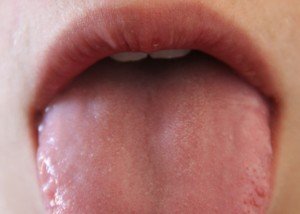
Have you noticed that lately, your tongue is rather stiff?
There are a number of possible causes, according to Dr. Stacey Silvers, MD, of Madison ENT & Facial Plastic Surgery in NYC, who is board certified in otolaryngology (ear, nose and throat).
List of possible causes of a stiff tongue
Dr. Silvers says, “Many things can affect the tongue: poor oral hygiene, different medications, infection, vitamin deficiencies, Sjogren’s syndrome, yeast infections, acid reflux, smoking and other tobacco use, excessive coffee intake and dehydration.”
Sjogren’s syndrome, which affects mostly women, is an autoimmune disorder characterized primarily by impaired secretion of moisture by the lacrimal glands (tear glands of the eyes) and salivary glands.
The resulting dry mouth can lead to a feeling that your tongue is stiff.
A dry mouth can cause a stiff tongue.
Dr. Silvers continues, “Unless a patient has an issue with the salivary glands in general (Sjogren’s syndrome or a history of radiation to the oral cavity), then one blocked salivary gland by a calcification will not affect oral dryness, as the minor salivary glands play a large role in hydration.
“Diagnostic testing involves reviewing diet and tobacco use.”
A doctor will also want to know about any medications that you began taking at around the time you started noticing that your tongue was getting stiff.
A physician may also want to take blood work to test for an underlying connective tissue disorder, adds Dr. Silvers. “Medications like Salogen (3-4 x per day) can improve oral hydration.”
Cancer
Unfortunately, cancer of the tongue itself can cause it to be rigid, with reduced movements.
This occurs because the cancerous cells invade and disrupt the normal tissue structure, leading to several physical changes in the tongue.
As the tumor grows, it invades the surrounding muscle tissues of the tongue.
This invasion leads to stiffness and rigidity because the malignant cells replace or disrupt the normal muscle tissue.
Plus, the presence alone of the tumor can limit the tongue’s ability to move freely.
This restriction is due to both the physical mass of the tumor and the inflammation or scarring that accompanies the cancer growth.
Are you at risk?
The main risk factors for tongue cancer are smoking, heavy drinking and an HPV infection.
Additiona risk factors are as follows: Chronic irritation from poor oral hygiene, such as persistent inflammation or infection, can increase the risk.
A diet low in fruits and vegetables and high in processed or salty foods can contribute to an increased risk of tongue cancer.
Persistent irritation from ill-fitting dentures or rough teeth may also bump up the risk.

An NYC expert in ear, nose and throat care, Dr. Silvers has been named among America’s Top Physicians and Surgeons in facial plastic surgery and otolaryngology numerous times since 2003.
 Lorra Garrick has been covering medical, fitness and cybersecurity topics for many years, having written thousands of articles for print magazines and websites, including as a ghostwriter. She is also a former ACE certified personal trainer.
Lorra Garrick has been covering medical, fitness and cybersecurity topics for many years, having written thousands of articles for print magazines and websites, including as a ghostwriter. She is also a former ACE certified personal trainer.
.
Top image: Shutterstock/Koldunov Alexey













